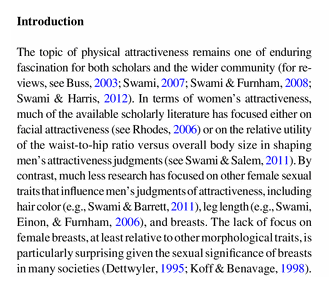I thought it would be an amusing start to the day – an article on breast size and sexism. (Sounds like ample opportunity for pithy puns, not to mention two cups that runneth over with double entendres.)
 However, the article in question piqued a prickly peevishness on my part. Reading on, with escalating exasperation, the study described culminates in conclusions that a male preference for large-breasted females is associated with being sexist or objectifying women. Though most men fall in the medium breast preference category (32.7%), apparently those who like them large (19.1%) or extra large (15.5%) constitute 43.5%.
However, the article in question piqued a prickly peevishness on my part. Reading on, with escalating exasperation, the study described culminates in conclusions that a male preference for large-breasted females is associated with being sexist or objectifying women. Though most men fall in the medium breast preference category (32.7%), apparently those who like them large (19.1%) or extra large (15.5%) constitute 43.5%.
Yikes!
Yes, I’m paraphrasing. Yes, my mirth morphs into concern. But not necessarily for the reasons you may suspect.
In “Male Attitudes May Predict Breast Size Preference,” we are informed:
A recent study from the University of Westminster [U.K.], published in February in the Archives of Sexual Behavior, showed that men’s attitudes toward women influence their attitudes about ideal breast size. The researchers interviewed 361 white, heterosexual men, ranging in age from 18 to 68.
Studying Chemistry (of the Sexual Sort)
Now, now. We’ll get to my own (damning) conclusions in a moment. Perplexed, and plunging into the details and assumptions of the small study size and single demographic of the study itself – (how can 361 white British men be representative of anything of note?) – I lose interest (momentarily) in the research design as I am gobsmacked by something else.
The introductory paragraph of the scholarly abstract.
 Unfortunately, I can’t get much more in terms of detail, I am struck by the fact that scholarly minds are hard at work disassembling our female bodies to determine the impact of leg length or waist-to-hip ratio or anything else on attractiveness, which is then to be linked, associated, or correlated with social constructs, behaviors, or… what?
Unfortunately, I can’t get much more in terms of detail, I am struck by the fact that scholarly minds are hard at work disassembling our female bodies to determine the impact of leg length or waist-to-hip ratio or anything else on attractiveness, which is then to be linked, associated, or correlated with social constructs, behaviors, or… what?
Um… academic study in order to better Photoshop our fourteen-year-old models and feed the flames of the feminine flagellation factor?
Returning to the Huff Post article which reports on the study’s conclusions:
… a preference for large and very large breasts was significantly correlated with overt sexism, benevolent sexism, female objectification and hostile attitudes toward women. This connection was strongest when it came to benevolent sexism. In other words, men who tend to idealize “traditional” femininity and perceive women as meek and weak, are also the most likely to prefer big boobs.
Would we ever objectify a man to the point of reducing him to individual body parts and drawing conclusions about the women who prefer A to B or B to C – a pecs-to-penis comparison with correlations to sexual politics? To potential for romantic or professional belief systems? To behaviors, not to mention gender roles?
Um, doubt it.
And why?
Because we don’t reduce men to body parts, at least, we don’t do so to the extent that we do women – and that includes women buying into this whole absurd and self-limiting view of, well… Self.
Benevolent Sexism? Are Women Part of the Problem?
Sure, we’re bombarded with media messages and images to the point of not even noticing that we objectify ourselves, and lose all perspective.
 Open any fashion magazine. Browse online. And I’m the first to admit I love my magazines and find an elegant ad to be a work of art. But what of our erosion of the capacity to perceive individuals as a whole? Our focus on the visual – and digitally modified at that – over the other senses, much less the substantive?
Open any fashion magazine. Browse online. And I’m the first to admit I love my magazines and find an elegant ad to be a work of art. But what of our erosion of the capacity to perceive individuals as a whole? Our focus on the visual – and digitally modified at that – over the other senses, much less the substantive?
Are we really bemoaning the absence of sufficient leg length studies on women? Wouldn’t gender awareness or communication skills training be more in order, or any other sanity-check we might devise?
I will hasten to add that the abstract itself – what I could access of it – says:
These results were discussed in relation to feminist theories, which postulate that beauty ideals and practices in contemporary societies serve to maintain domination of one sex over the other.
Huh. And I repeat: Then what?
As for the notion of “benevolent sexism” – defined in a Prevention article as the idea that “women are wonderful but weak,” would anyone care to address that hapless hornet’s nest?
But here’s the kicker from the Huff Post article.
… knowing that some guys may associate your big boobs with weakness is NOT a reason to have a breast reduction.
Sexual Assumptions, Sexual Ignorance, Tacit Acceptance
Hello? Seriously?
There is an implicit assumption in that statement that women would consider hacking up their bodies to yield a more “acceptable” form to men – personally or professionally.
And the sad part is – to many women, those ideas tempt and torture us, as we consider the surgeon’s knife in order to keep a husband, to get more dates, to be “presentable” in our work lives or even to remain competitive in a youth-obsessed culture. And I do not exempt myself from those who picture a tweak here, a tuck there – easy enough to imagine in a mirror, and a whole other story when it comes to all that entails – and the message it delivers to and about ourselves as we are, not to mention what it says to our daughters, our sons, our lovers, our employers… about values, worth, and how we derive our sense of competence.
Isn’t that what we should be looking to change?
Men and Women are Different, Yes. Laws of Attraction Vary, Yes.
Chemistry between heterosexual men and women? Inevitable, and pleasurable, as long as it doesn’t devolve into harassment.
 And may I add that I’m all for sensuality, sexuality, and the respectful enjoyment of both? May we agree that attraction is far more complex than gorgeous gams or a resplendent rack?
And may I add that I’m all for sensuality, sexuality, and the respectful enjoyment of both? May we agree that attraction is far more complex than gorgeous gams or a resplendent rack?
And on that note, I’ll toss my own “representative” sample into the mix. I asked one intelligent, middle-aged, sexually active male about his preference for breast size. Admitting to experience with a range of options, he offers this: “I like big breasts as long as they come with big brains.”
My amusement aside – breast size surveys achieve what, exactly? Assuming there were validity to the results, the call to action that would follow would be what?
Boob studies are for boobs. I wonder how the university trustees in this case will react if next on tap is the correlation between female leg length and male sexual response, or female leg length and feminist theory…
All men are attracted by shiny bobbles but after the honeymoon is over, it’s the contents of the package which will keep them coming back. However, I repeat ladies that you have an entire arsenal of techniques to attract a man and keep him coming back. And that takes brains. Yes, we guys can sometimes be shallow, but I do like to think we can also rise to the occasion.
Besides, I know you’re secretly checking the ratio between my index finger and my ring finger.
The Boob that wrote this study made a bit of a cock up. While trying to keep academics abreast of the subject, his study has gone tits up. While I appreciate all good things large or small, I feel no need to engage in a tit for tat discussion. Since this study is clearly a bust, the person that funded it must be in a booby hatch. This whole article leaves me colder that a witches tit. Alas, I say vive la difference!
Ah Curtis… a response after my own… heart. 😉
This fascination with tits, boobs, breasts will probably never end. And as long as ‘we’ continue to engage in the quest for beauty, we, women, keep this alive. The challenge is to get women to stop trying to make themselves into the perfect Woman for a man. To live our lives suiting only ourselves–not rushing to magazines and movies to figure out what we should look like!
Like you, I have no idea why researchers keep throwing money at inane studies like this…. a bunch of men who regret not having been breast fed?
I happen to be sleeping with a “breast man”. It’s funny at times. He’s one of the smartest men I’ve ever met–well-rounded, well-bred and he has a thing for breasts. I know what he likes because he’ll often ask my opinion–which serves to irritate and amuse. Thankfully he finds the huge breasts a little unattractive.
When I was in my early twenties looks probably outweighed personality, but I wasn’t interested in a relationship. When I matured and learned how a great relationship enhanced everything I figured out that a great rack didn’t do much unless the personality that came with it was bigger.
“Resplendent rack.” That needs a sonnet.
I suspect I may need some Shakespearean Sonnetizing this week, Wolf… Stay tuned…